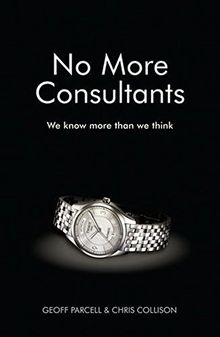
We have all smiled at the apocryphal tale of the consultant who borrows your watch to tell you the time, and then walks off with your watch! Deep down, we all know that there is an element of truth in the story.
If we only recognised and released the capabilities which we had on the inside, our organisations could be so much more efficient, effective and purposeful with the money they spend on consultants.
No More Consultants provides readers with everything they needed to tap into those capabilities. Using the tools and techniques in this book, readers will be able to drill deep inside their organizations to realise the value of their existing knowledge. Employees will feel valued and listened-to, and investment on consultants can be reduced or redirected to the places where there is a genuine need to build new capability.
* The book is rich with real-life examples of application. At its core is the self-assessment process which has been applied to a variety of issues, including: supply chain management, business improvement, learning and development, operational excellence, knowledge management, and the worldwide response to AIDS.
* By applying the innovative 'River Diagram' to the results of the self assessment, you can clearly map-out where the strengths and weaknesses in your organisations lie, and where there is scope for sharing.
* This map will help you plot the course of your improvement strategy. No More Consultants contains several practical techniques designed to close the gap between the lowest and highest performers, saving your business time and money.
* Illustrated using an exciting collection of stories and examples: including BP, Oracle, United Nations, the NHS and Nationwide Building Society
"You cannot approach a book called No More Consultants without being affected by the title. Whether you are punching the air shouting 'about time' or whether you are muttering to yourself 'we consultants are having a tough enough time already', you will have a view. But you'll soon realise that No More Consultants is not about some mass cull. It is about organisations clarifying what they are looking to achieve, accessing the resident knowledge and capabilities, and learning from within before looking for outside advice.
I came to this book knowing about the techniques and having used them. I can attest to their value. What I was less sure about was whether you can learn all this from a book - or whether, ironically, you might need to employ a consultant. There is no doubt that No More Consultants is accessible. The style is easy and the concepts well explained. I particularly like the metaphors, the step-by-step guide and the mix of real case stories. It carries its sophisticated thinking with a certain lightness that will surely appeal to busy managers reading it on the train. I suspect that seasoned knowledge managers and change facilitators will be fired up enough to have a go themselves. But there will be many more who will want a bit of help to get them started.
So what are these techniques? Firstly, take any function or challenge in your organisation. Now create a framework that defines the key components of success that are graduated on a scale ready for self assessment. Engage with the key players to determine where you are now and where you want to be. Compare with what others are doing in your organisation so that they can share their success with you and vice versa. Work out how to continuously improve.
My favourite stories in the book involve developing a knowledge culture in the NHS and the sharing of expertise on organic rice farming in Thailand. The former reveals the energy that can be released, which is what breathes life into any initiative, and that what may seem like mechanistic tools on paper are actually about human learning as well as organisational improvement. The latter illustrates that knowledge sharing is just as crucial in a community setting as it is in a large corporation looking to drive up its margins.
The secret in these techniques - with curious names like River and Stairs Diagrams - is the powerful combination of structured, systematic thinking with a carefully nuanced understanding of how people and organisations actually work. The most potent persuader, which is perhaps underplayed a little, is that these techniques can help you save money as well as spreading good practice around the organisation. The main investment is time, but the potential cash returns, if that is what you are seeking, are there to be had. Not just by employing less consultants, but also through sharing lessons learnt around efficiency savings.
The authors used to work for BP so they may not like me citing an ex-Shell manager, Arie de Geus. His mantra was that learning is the only sustainable source of competitive advantage. This book shows you how. And if, like me, you work in the public sector, you'll know that we often succumb to the consultant knows best disease. No More Consultants could be the antidote you have been seeking."
--Graham O'Connell, Head of Organisational Learning & Standards, National School of Government
© 2025 momox SE Berlin. Buy used CDs, DVDs, books, films and games cheaply and securely online.